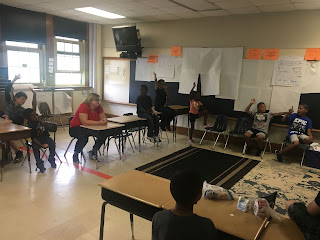This summer, students have voted to have some craft activities (melting beads, slime) and to change the way we line up when going to another activity (recess, lunch, gym, computer lab). We've also seen kids settle disputes among themselves by voting. "Let's vote!" is shouted whenever there is a decision to be made. To be honest, "Let's do rock, paper, scissors!" is also shouted. Sometimes we have to vote about whether to decide by vote or by the rock, paper, scissors game! In any case, the students are enjoying the power of the vote. Let's hope they hold on to that as they get older!
 |
| Students voting during morning meeting |
Adding craft activities, deciding to join other classes on a field trip to the farmer's market, and having a daily line leader are all fairly easy decisions that the students have made. However, during week three, we hit a major problem as students let their voices be heard about one of the bed rocks of the LEAP program -- Book Club. During morning meeting, a student suggested we stop having Book Club -- the reason? It's boring, we were told. This happened as we had moved into longer chapter books and the kids were wishing they didn't have to read the same book day after day. (Earlier books had been completed in one or two days.) What to do? We had told the students we valued what they had to say -- and they had a major critique.
In the end, we gave them a limit. We needed to do something that encouraged their reading and writing. We are here to improve literacy skills. So that was a hard limit -- any suggestions they had about what we could do during Book Club would be taken seriously, as long as they promoted reading and/or writing.
Each child sat down and wrote me a letter suggesting improvements to Book Club and giving reasons that their suggestion would be good and would promote literacy. Some kids asked that we leave Book Club as it is -- no changes! It's fun as it is. Other kids had suggestions about writing their own book or reading a book and then turning it into a play. Fortunately, we have three teachers in the classroom, so we were able to make everyone happy. Ms. Claire continued reading Junie B. Jones and that Meanie Jim's Birthday with the children who liked Book Club as it is. Ms. Emily began to work with students who wanted to write their own graphic novel. Last, a group of students worked with me to turn Stone Soup into a play. They've taken the story and added their own ingredients -- including pizza, chocolate, and sweet coconut.
 |
| The cover of the graphic novel written by students |
In the end, the students are more engaged because they are using their literacy skills the way they want to. And they are still learning important literacy skills. The two groups who created their own stories learned about the importance of a narrative arc and are writing their own unique ideas.
Perhaps even more important that the literacy skills that the children worked on, the value of hearing everyone's voices, negotiating for good solutions, giving reasons for their positions, and voting has become central to how the kids work through situations. Here is one example: our trip to the Farmer's Market was delayed by rain. When we went on the rescheduled day, some of the children had forgotten to bring money. I had a small group -- four young men -- and gave each of them one dollar (which was all I had with me). They bought some water (it was a hard day) and were down to two dollars when we reached the bakery booth. Delicious, homemade cookies beckoned -- but they were four dollars for a package. The kids huddled in front of the booth, discussed how they could pool their money and which treats they should buy. One child didn't like chocolate, so they negotiated over whether to buy chocolate chip cookies (which only had small amounts of chocolate) or snickerdoodles. They settled on the snickerdoodles, but were still in trouble, since they didn't have enough money for a full package of cookies. The woman who ran the booth had overheard their discussion and was impressed by how they were working as a team, pooling their money, and trying to be fair to all -- so she sold them the four dollar package for two dollars! I was so proud of how they had used democratic values to solve their problems -- and pleased that they got recognition for their efforts from someone outside the program.
No comments:
Post a Comment